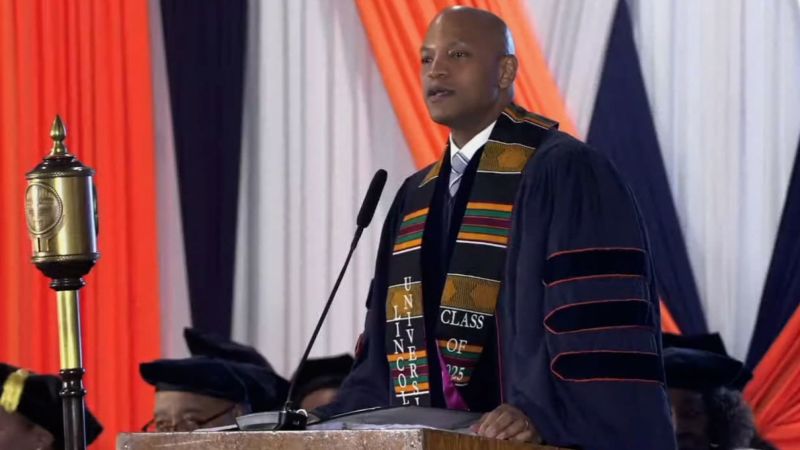Maryland Governor Wes Moore is currently gaining significant attention on the national political stage through various public appearances and engagements. From his spirited participation on the influential talk show “The View” to his influential commencement speech at Lincoln University — a historically Black institution in Pennsylvania — Moore is positioning himself as a pivotal figure in shaping the Democratic Party’s strategy heading into the presidential elections, particularly focusing on the critical role South Carolina Democrats may play in the 2028 nomination.
Moore’s emergence as a rising star within the Democratic Party is particularly notable as the party faces challenges in countering the tactics of former President Donald Trump, who is advancing his agenda for a potential second term. During an interview with CNN, Moore articulated a vision of unity and service, emphasizing the importance of understanding and collaboration among Americans from diverse backgrounds. “We need to be a country that really gets to know each other again and works together and serves together,” he stressed, advocating for a collective commitment to national service.
This optimistic outlook, however, comes amidst discontent within the Democratic ranks regarding the prevailing leadership and the strategies employed against Trump. A recent CNN poll highlighted this discontent, revealing that only 38% of Democrats approve of their party’s leadership, while a substantial majority, 61%, expressed disapproval. In light of this internal criticism, Moore, who made history as Maryland’s first Black governor, acknowledged the ongoing frustration experienced by constituents. “A lot of the frustration is justified. I get it,” he stated, underscoring the need for the party to recognize the struggles faced by many Americans.
To bridge the gap between the Democratic leadership and its constituency, Moore suggested that the party adopt a “culture of repair,” which would connect more meaningfully with those who feel neglected by the current political status quo. His agenda includes ambitious policy proposals that include raising the minimum wage, investing in apprenticeship programs, funding mass pardons for cannabis-related offenses, and increasing taxes on the affluent. These initiatives reflect a commitment to progressive reforms that aim to uplift marginalized communities.
In his commencement address at Lincoln University, Moore encapsulated this sentiment of national pride with messages that resonate with his personal history and heritage. He shared the inspiring story of his grandfather, Rev. James Thomas, who overcame adversity and violence during the era of the Ku Klux Klan, emphasizing that patriotism requires acknowledging America’s complex history rather than glossing over its imperfections. Moore articulated that true patriotism involves both pride in the nation and a commitment to address its flaws.
Furthermore, he commented on the divisive political climate, portraying it not merely as a left versus right or red versus blue scenario but as a battle between those who wield patriotism as a weapon against others and those who grapple with the heritage of their nation without losing hope. This unique approach to patriotism distinguishes Moore from many of his Democratic counterparts, who often hesitate to promote national pride amid criticisms of the status quo.
Meanwhile, reactions among Democratic leaders vary in their approach to confronting Trump’s administration. Figures like Illinois Governor JB Pritzker have adopted a more combative stance, urging increased opposition to Trump’s actions. In contrast, figures such as Michigan Governor Gretchen Whitmer seek to find common ground with the administration, as evident from her efforts to secure military resources for her state.
When discussing his willingness to collaborate with the current administration, Moore expressed skepticism. “While I will work with anyone, I will not bow down to anyone. We’re not built that way,” he asserted, highlighting the necessity for reciprocity in any partnership, which he believes the current administration has failed to uphold.
As Moore focuses on his reelection campaign set for next year, speculation surrounding his potential candidacy for the presidency in 2028 grows. When questioned on his aspirations, he consistently rebuffs the notion of an immediate presidential campaign, instead prioritizing his commitments to Maryland’s progress. He stated that anyone looking to 2028 at this juncture isn’t taking the present seriously.
In the near future, Moore is scheduled to travel to South Carolina, where he will headline a dinner for the state’s Democratic Party. His message there is expected to resonate with themes of strong leadership and a proactive approach to the duties of governance, emphasizing the importance of not retreating from challenges and instead boldly leading and inspiring constituents. “The measure of our success will be how we choose to lead,” he plans to convey, underscoring his commitment to a dynamic governance that focuses diligently on pressing societal needs.



